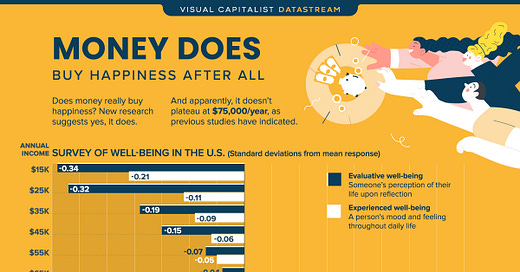Everything I’ve been told about life is a lie. Lies over and over again.
I grew up in the millennial generation, where we all got participation trophies and were told to follow our dreams and do what makes us happy. Too bad we ignored all the student debt we accrued. Don’t worry, we all eventually found our way to law school or sales or insurance or whatever pays the most and are for the most part miserable doing some job we never intended to do. But at least we’re miserable together!
Then they said “No no no, that isn’t right. Make $75K to sleep well at night.”
Sorry, maybe that was my daughter’s night-night book? I’m losing track here.
This 2010 study showed that after you start making around $75K, the benefits of making more tended to taper off. The theory was that those who earned more probably worked more and had less work-life balance, or had too much lifestyle creep creating more responsibility and more stress. After making $75K, all your basic needs would be met, and on top of that you’d have extra to spend on vacations and hobbies and experiences.
See? It’s all good people! Go live your best upper middle class life. If you made more, you’d probably just end up worse off, not better.
But now NEW new evidence shows that well… that’s also not true. The fact is: to be more happy, just make more money.
Past research on happiness relative to income has relied on retrospective data, which leaves room for human memory errors. In contrast, this new study uses real-time, logged data from a mood tracking app, allowing for a more accurate representation of respondents’ experienced well-being.
Data was also collected by random prompts over a period of time, with dozens of entries logged for each single respondent. This provides a more well-rounded representation of a person’s overall well-being.
Two forms of well-being were measured in this study:
Experienced well-being
A person’s mood and feeling throughout daily life.Evaluative well-being:
Someone’s perception of their life upon reflection.Both forms of well-being increased with higher incomes, but evaluative well-being showed a more drastic split between the lower and higher income groups.
One of more interesting theories as to why more money makes us happier is the perception that more money makes us happier:
Not all respondents cared about money. But for those who did, it had a significant impact on their perceived well-being. In general, lower income earners were happier if they didn’t value money, while higher income earners were happier if they thought money mattered.
So maybe it doesn’t matter 100% of the time, but you’re statistically more likely to be happy if you make more money. I think a lot of that has to do with having control over your time, which your most valuable and limited resource.
But either way, how you perceive your life will determine how happy you make it. So I think the lesson here is make as much money as you can, but not at the expense of the things you truly value like family, time, optionality, or playing “Jedi: Fallen Order” instead of writing more blog posts.
And I’m stealing this from Visual Capitalist because it’s a good line:
Whatever the cause may be, one thing is clear—Biggie Smalls was wrong. Looks like more money doesn’t necessarily mean more problems.
Thanks for reading!






So once it hits 250K, you stop feeling happier, but you would still be mentally better? What a surprise! I wonder if neighborhood relative wealth is also a factor of happiness?